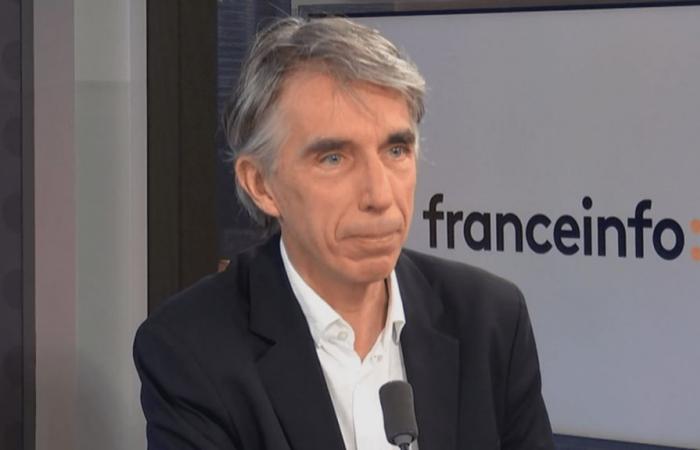
With the absence of a budget, what are the major concerns of individuals and businesses? While lowering its growth forecasts for the euro zone, the European Central Bank (ECB) lowered its key rates by 0.25 points, Thursday December 12, seeming to want to revive growth.
In recent years, the ECB has raised its interest rates to “break the inflationary spiral”explains Philippe Crevel, but today we enter “in a new cycle”with a continuous drop in rates since 2023, which aims to revive investments, in businesses and in real estate.
franceinfo : What reading do you have of the ECB’s decision? ?
Philippe Crevel: With this 4th reduction in key rates by the central bank, we will have a total reduction of 1 point compared to 2023. And this reduction aims to revive the European economy which has been stagnant for almost a year. It is true that there is an urgent need to restart the economy by lowering the cost of credit, to facilitate investment or real estate projects. And so this will have concrete consequences for all households and for businesses, with a reduction in interest rates which will be charged by financial institutions.
So, it will be cheaper to borrow, for example if you want to buy a house or an apartment.
Yes, in the coming months, the interest rates that will be offered by banks, both for households to buy a house, and for businesses to make investments, will be lower. And so this will reduce the cost of borrowing. And that is good news for all economic players in France, because in recent months, things have been suffering a little in many sectors of activity, particularly in real estate.
The euro zone is not necessarily in great shape. Do these rate cuts come too late in hindsight? In your opinion, should interest rates have been lowered even further?
It's easy to redo the match afterwards.
“The objective of the European Central Bank was first and foremost to kill the inflationary spiral. This bet was won and today we are lowering rates in the hope of reviving activity.”
Philippe Crevel, director of the Savings Circleat franceinfo
We had very high inflation in 2022 until 2023, which reached 10%. And so the objective of raising interest rates was to break this spiral. This has been achieved. Today, the inflation rate is around 2.3% within the euro zone. It's even less in France. And so we can say that this bet was won. Obviously, there are negative effects of the rise in interest rates: it is growth, activity that has decreased. So, today, we are entering a new cycle, that of falling rates, with hope of a revival of activity.
How are the French behaving at the moment in terms of savings and consumption?
The French, since the Covid crisis, have been in “savings” mode and the latest results communicated by INSEE indicated that the average savings rate of the French was 18% of gross disposable income.
“Today, almost a fifth of income is put aside. So that’s 3 points more compared to 2019.”
Philippe Crevelat franceinfo
The succession of crises – Covid, war in Ukraine, inflation and then the political crisis since June – encourages the French to save and not to consume. And on the other hand, consumption is rather flat, evolving very weakly and therefore this is reflected in France's GDP, with growth expected to be zero in the last quarter. After having had a small but not insignificant gain in the 3rd quarter, due to the Olympic Games, we are paying a little for this “game effect” with growth which should be zero in the last quarter.
Currently, the Livret A rate is frozen at 3%. This will change next February, what can we expect?
The rate of the Livret A booklet, like the sustainable development booklet, like that of the popular savings booklet, should fall on February 1 because inflation has decreased and interest rates are falling. We should certainly come back from 3% towards 2.25 or 2.5%. So there will inevitably be a drop in the rate of the Livret A account and also for the small popular savings account which should certainly go from 4 to 3%. Afterwards, it is obviously the Minister of the Economy, when he is appointed, who will be responsible for choosing these rates. If we don't have a minister, perhaps we will stay at the current rates.
What is the most popular savings product in France today?
“In volume, the first investment remains life insurance. It's 1,900 billion euros. So it's much more than the Livret A, which is around 400 billion euros.”
Philippe Crevelat franceinfo
The first product is life insurance, with collections improving in recent months. Which suggests that the French have a more long-term vision and take a little less precautions. And then there are the returns that come into play. The French know that the A booklet will decrease and the return on life insurance will increase a little. So there are trade-offs, which proves that the French are quite observant and quite smart when it comes to savings.
Savings and consumption are often opposed. But you say that it is perhaps a bit sterile as an opposition?
Yes, because we need savings. Savings don't sleep. You don't put money in a safe. Savings are used. This allows you to finance the credit. When we put it on the A booklet, behind it is social housing which benefits. When we put on the sustainable development booklet, it is useful for SMEs.
“Life insurance is used to finance the State. And today, the State needs money, and we don’t want it to go bankrupt.”
Philippe Crevelat franceinfo
And besides, if France has not been downgraded as strongly as it could have been by the rating agencies, it is because we have a high savings rate. So this contributes to state funding. And then the stock savings plan finances companies like the retirement savings plan. Today's savings are tomorrow's investment and therefore the growth and employment of the day after tomorrow. So for me, one should not be pitted against the other. Obviously, at date T, if there is much more saving, there is less consumption. So it has a negative effect on growth, but in the long term, it is much less true.





